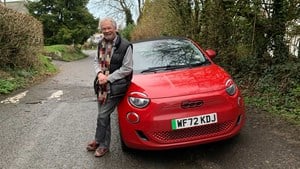Why I switched to an electric car at 70
3 minute read

Part-time university professor Chris Southgate has made the switch to an all-electric car. He loves it, though is still learning to live with range anxiety.

Get Car Insurance
Age Co helps drivers over 50 find the right protection. We are 100% owned by Age UK and our profits go back to the charity.
When eco-theology professor Chris Southgate decided to buy an all-electric car, he saw it as a way of reducing his carbon footprint. An important consideration for a 70-year-old academic who’s spent much of his working life thinking and writing about climate change.
A lifelong motoring enthusiast, Chris was also attracted by the thought of blazing a trail and getting ahead of the 2035 ban on new petrol and diesel cars. “I reasoned that the change was going to come, so I may as well get used to it now,” he explains.
His mind made up, Chris gifted his beloved petrol-powered Audi A1 to his son. He wanted a compact car that would accommodate his golf clubs, so he narrowed his options to the Mini Electric and the Fiat. In the end, he plumped for Italian flair over Germano-British engineering and opted for a cherry red Fiat 500e cabriolet.
Tips on transitioning to an electric car
“Although I wanted to switch to an all-electric car as my daily driver, I did so knowing we still had a petrol car for longer journeys,” says Chris. He and his wife also own a Fiat Panda 4x4, which means they have a get-out-of-jail-free card for those long journeys when Chris’s range anxiety kicks in and he’s afraid that the electric car will not have enough battery to reach their destination.
Even so, Chris is committed to using the 500e as his everyday motor. That means it’s important to have a reliable charging set-up – which he has, with a wall-mounted charger at his home and subsidised charging at the university where he teaches part-time.
“Although there weren’t any grants available towards the purchase cost, Fiat did supply the home-charging point free of charge, minus installation,” he says. “It means I can start my journeys with maximum range, though it’s cheaper to charge at work. If I’m spending the day on campus, I wait to charge up there.”
Talking of range, one thing Chris is disappointed with is the cabriolet’s real-world mileage. “The official figure is 199 miles, but the onboard computer reads 161 miles when I have a full charge,” he says. “In practice, this soon goes down once I turn on the heating or get up to cruising speed. What’s more, rapid charging only runs to 80% of capacity. It would be hard to do a motorway journey of more than 100 miles without stopping.”
What are the benefits of going electric?
While understanding what distances your electric car and its battery can manage is part and parcel of electric vehicle (EV) ownership, Chris is quick to point out the rarity of it actually restricting his vehicle use. “For 29 days of the month, it’s the perfect car,” he says. “It’s ideal for the 50- or 60-mile trips around Devon I routinely undertake: comfortable, quiet, nippy and easy to manoeuvre in town and on country roads.”
No surprise, then, that Chris is a convert to electric motoring. “If the time comes when I only have one car, it will definitely be all-electric,” he says. “Despite some warnings from friends before I bought it, I’ve not found it any dearer to insure the 500e – and day-to-day running costs are lower. I expect routine maintenance to be cheaper too, because there are fewer moving parts to service in an electric vehicle
“It’s easy to change your habits to suit the technology,” he continues. “Charging stops are healthy, really, and help ease fatigue. Overall, the driving experience is relaxed, thanks to features like automatic engine braking when you ease off the throttle.”
How to find the cheapest EV pump prices
Chris’s knowledge of the charging infrastructure is developing, too. He says EV-owning friends are a great source of insight when route-planning, along with technology such as Zap-Map, an app that locates UK chargers. “I know where the rapid chargers are in the South-West – and where the expensive ones to avoid are. As I get more confident in the process, it becomes easier to find cost- and time-effective charging.”
He’s already seeing improvements in his driving habits. “I tend to drive more steadily than I used to. It’s good to think about the energy you consume in everyday life. For my generation, who often take shorter, more local journeys, it’s easy to make the switch. We can steer a course for others to follow.”
Summary
Considering an electric vehicle? Here are some key points from Chris’s own experience:
- Electric vehicles are a great way to reduce your carbon footprint, while also getting ahead of the 2035 ban on new petrol and diesel cars
- Chris has a petrol car in reserve for longer journeys. Electric cars do have a limit on what they can do on a single battery charge
- Some manufacturers will include the supply of a home-charging point free of charge with your purchase (minus installation costs)
- Those who switch to an electric car may find it useful to plan their journeys in advance, taking into account charging points. Apps like Zap-Map can be a great resource to have at hand

Sign up to the Age Co Newsletter
Each month, our email newsletter delivers inspiring stories, practical guides to later life, plus the latest news about Age Co and the charitable work we support.
